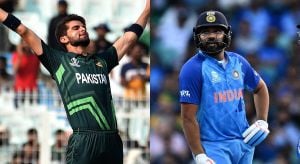On February 23, 2025, the cricketing world witnessed another thrilling chapter as India and Pakistan clashed during the ICC Champions Trophy at the Dubai International Cricket Stadium. This highly anticipated match was marked by significant changes within the Pakistan squad and tension surrounding injuries on both sides.
Pakistan's star opener, Fakhar Zaman, was ruled out of the tournament due to injury after suffering during the match against New Zealand. His replacement, Imam-ul-Haq, stepped up to the plate, bringing both opportunity and controversy, as he has faced his own share of issues off the field.
Fakhar Zaman, who had to make his exit from the tournament, shared his sentiments on social media: "I feel proud to have represented Pakistan, unfortunately, I have to withdraw from the Champions Trophy 2025." His emotional farewell highlights the personal stakes involved at such prestigious events.
Imam-ul-Haq, now stepping onto the grand stage, was hopeful about his opportunity, stating, "This Champions Trophy is another big chance for me to perform well for Pakistan." Having already made his mark with 3138 runs and averaging over 48 since his debut, he needed to excel, especially under the shadow of his predecessor's absence.
On the other side, Indian captain Rohit Sharma maintained confidence, emphasizing, "I would have chosen to bowl first if I had won the toss," reflecting on the competitive edge within the teams. India's strategy and lineup remained intact, including heavyweights like Virat Kohli and Hardik Pandya. They aimed to build on their momentum after their recent victory over Bangladesh.
The Pakistan team had another hurdle as Mohammad Shami, India's speedster, faced ankle issues, forcing him to leave the field after delivering five wides. He initially seemed out of sorts, contributing to the tension on India's side. Nevertheless, he returned to action by the 12th over, showcasing resilience and determination to keep the pace of the match.
Initial stages of the innings saw Pakistan off to a cautious start, with openers currently at the crease after two overs with no wickets lost. Underneath the spotlight, both teams were well aware of the stakes of this match. The previous performance from Pakistan, which saw them lose to New Zealand by 60 runs, intensified their need for survival.
Mohammad Rizwan, Pakistan's captain, addressed the team’s approach by stating, "The wicket looks good, and we will try to set a good score here." His leadership would be key as the innings progressed, particularly following the loss of early wickets.
After 9 overs, Pakistan faced their first major setback with the wicket of their captain Babur Azam, who was dismissed for 23 runs by Hardik Pandya, who took advantage of the form and focus he had honed throughout the tournament.
Despite the pressure, hopes remained for the Pakistani side, especially after Imam-ul-Haq's arrival at the crease. Yet, soon after, he fell victim to direct hit from Axar Patel's throw, leaving the team reeling at 10 runs with another wicket lost. The scoreboard looked grim for Pakistan as they strove to recover against the Indian bowling attack.
Both teams played with intensity and focus, reflecting their historical rivalries and the ramifications for future matches. The atmosphere crackled with energy as fans rallied behind their teams, echoing the sentiments of anticipation and pride inherent to such clashes.
With every run and every wicket carrying substantial change for both teams, this match represented more than just points; it represented national pride, legacy, and the countless dreams of players stepping onto one of the world’s biggest cricketing stages.
Whether the changes within the teams or the struggles against injuries, all are woven intricately within the fabric of this intense rivalry, likely to create historic moments as the match and the tournament continue.



